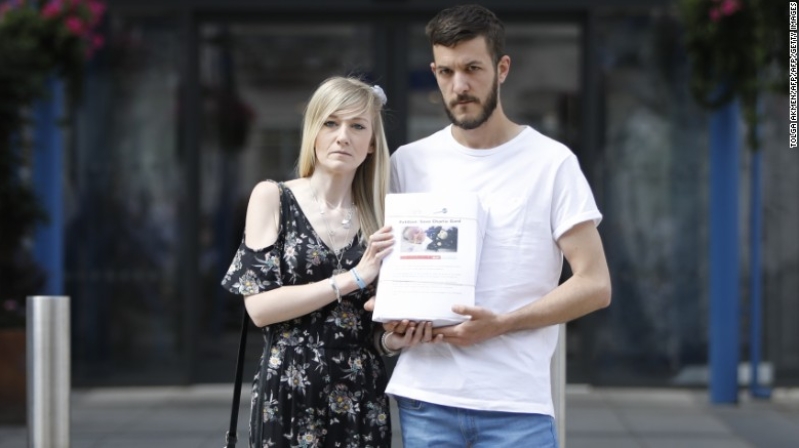
The parents of Charlie Gard are begging doctors to help them convince a judge to fulfill their final promise to their son and take him home to die after dropping their legal battle to give the terminally ill British baby further treatment.
On Tuesday, the little boy's mother Connie Yates issued an emotional, last-minute plea to "any pediatric intensive care doctor to come forward" to help the parents fulfill their "last wish".
"We promised Charlie every day we would take him home. It seems really upsetting, after everything we've been through, to deny us this," she said.
London's Great Ormond Street Hospital (GOSH), which is caring for Charlie, believes the infant should go to a hospice - or stay with them - because his ventilator, which can "only be provided in a hospital setting", won't fit through the front door and doctors fear he could suffer pain or a "distressing or disordered death".
Charlie suffers from an extremely rare degenerative condition called mitochondrial DNA depletion syndrome, which has caused brain damage and left him unable to move his limbs.
GOSH argued in court Tuesday that it had "moved heaven and earth" to fulfill the parents' wishes, but said that no intensive care pediatric doctor in the country was able or willing to supervise his care at home.
In turn, Grant Armstrong, the parents' lawyer, said that the couple takes issue with the "brutality" of moving Charlie to hospice, only to have him die shortly after.
Armstrong also said that contrary to the hospital's claims, it had actually put up "obstacle after obstacle" to bringing Charlie home. He said that the couple were willing to fund all costs for out-of-hospital medical staff and had other suitable family properties if needed.
Justice Francis, who is presiding over the case, will make a decision today, according to The Mirror. It has been decided that Charlie's life support will be switched off on Monday, July 31.
"I am sensing that timing is a lot of the problem here," said Justice Francis. "It now seems to hinge partly on how long parents want to keep Charlie alive at home."
As earlier reported, while announcing they had decided to drop their legal battle to give Charlie further treatment, Yates said the 11-month-old could have lived a normal life if he had been given treatment earlier.
"This is the hardest thing we'll ever have to do," she said. "We have decided it is no longer in his best interests to pursue treatment. We have decided to let our son go ... Charlie did have a real chance of getting better. Now we will never know what would have happened if he got treatment."
Charlie's parents had for months sought to send him to the United States to undergo experimental therapy, but Britain's courts, backed by the European Court of Human Rights, refused permission, saying it would prolong his suffering without any realistic prospect of helping the child.
Armstrong said the parents had dropped their legal fight for Charlie to continue to receive treatment because scans showed that the child suffered irreversible damage.
"For Charlie, it's too late, time has run out. Irreversible muscular damage has been done and the treatment can no longer be a success," he said.
"Charlie has waited patiently for treatment. Due to delay, that window of opportunity has been lost."







